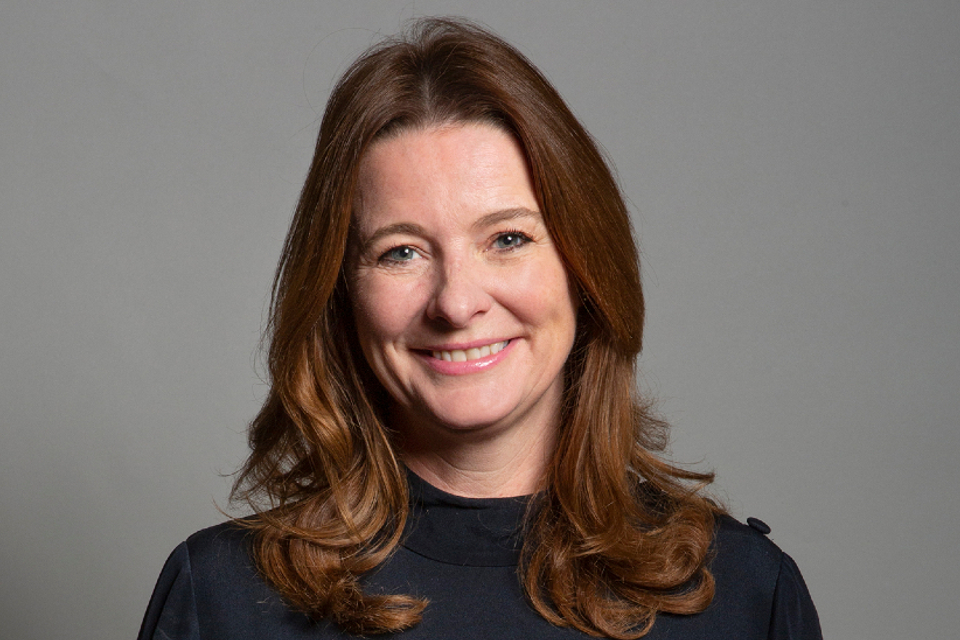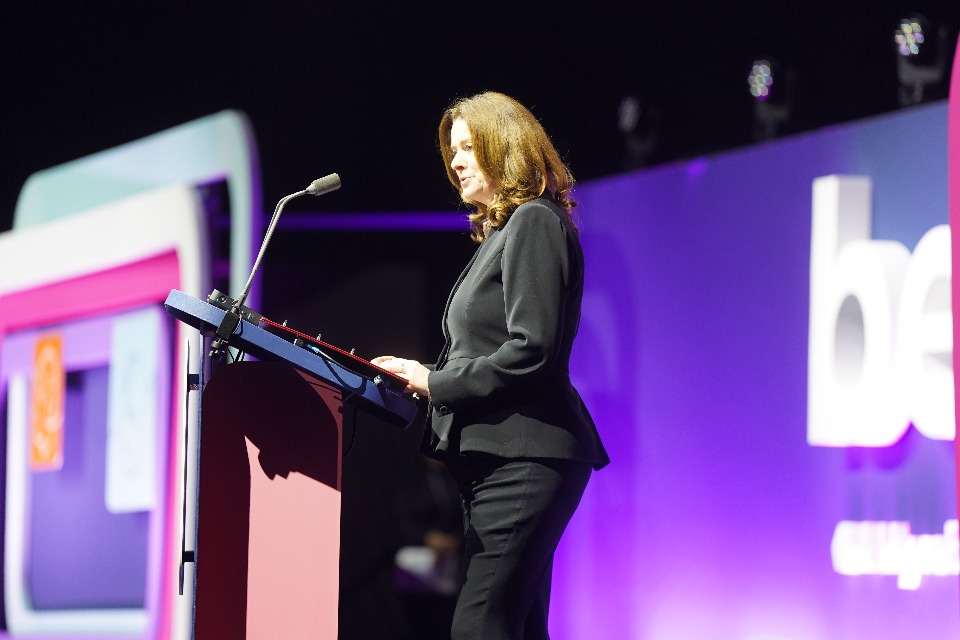Education Secretary addresses BETT 2024
Gillian Keegan sets out importance of evidence and innovation in approach to AI at Bett 2024.


Gillian Keegan gives opening address at Bett 2024
Thank you and good morning.
What a pleasure it is to be back here to open Bett 2024.
Since I stood on this stage in March last year, we’ve seen generative AI continue to develop at pace and spark conversations all over the globe.
These conversations have highlighted some of the opportunities and the challenges that AI might bring.
Last week I spoke with Sal Khan who runs the Khan Academy in the US, who many of you will know.
Sal’s spoken previously about the risks associated with using AI in education, including how students use ChatGPT.
He shares my view that whilst we need to mitigate those risks, we’re approaching a time when we will see a monumental shift in the way in which technology is used in education.
At the Khan Academy, they’re using AI to generate personalised tutors for students and virtual assistants for teachers.
In a recent meeting, Sal demonstrated how the AI can facilitate debates with students, provide instant feedback to learners, help design a bespoke curriculum and can even imitate a fictional character to bring learning to life.
So, imagine a school where every student and teacher has the support of artificial intelligence.
Imagine the power of bringing a virtual George Washington into the classroom to explain his role in the Revolutionary War.
Imagine how this can improve educational experiences for children and teachers.
But whilst we’re considering opportunities for the future, it’s important that we don’t ignore the challenges that come with using cutting-edge technology.
Last year, the Prime Minister hosted the AI Safety Summit at Bletchley Park to consider the risks associated with introducing these new technologies and discuss how they can be mitigated.
The summit confirmed the UK’s ambition to take the lead on safety and set the standard for other countries across the world.
As part of that ambition, we’ve introduced a new AI Safety Institute, which will ensure that the UK and the rest of the world are not caught off guard by rapid and unexpected advances in technology.
A key principle of the institute will be to share its findings with the rest of the world, ensuring that we’re building a global response to both the opportunities and risks that come with AI.
In education, we’re continuing to work closely with our regulators and the Office for Artificial Intelligence to make sure we’re using this technology responsibly.
I want to reassure you that when new technologies are emerging, our top priority is the safety of young people.
No matter how prepared we think we are, we need enough skilled people to ensure we grasp the opportunities and tackle any challenges that AI might bring.
That’s why we’ve introduced 21 Institutes of Technology, bringing education and business even closer together.
At the South Central Institute of Technology, based next door to the famous Bletchley Park, they’ve gone from code-breaking to code-making.
One of their first alumni, Deborah, came to the UK from Kenya at the age of 14.
She studied for a HND in cyber security and has spoken about how the institute helped her to develop the skills she needed to secure her future.
These are the results that we need to see everywhere.
These are the results that will help us to prepare for the future.
Higher technical qualifications, designed to help learners get the right training and skills they need, are available with over 60 qualifications approved in the digital sector.
Last year, over 22,000 learners across the country started on one of 30 digital apprenticeships, designed by leading employers.
These apprenticeships are helping us to train more data scientists, software developers and network engineers, just to name a few.
We’re also scaling up the delivery of our Skills Bootcamps to help transform the adult skills landscape and we’ve set an ambitious target of reaching 64,000 learners in key growth areas, including digital and green skills, by March next year.
I recently heard about Raymond, who graduated from university and found himself working in temporary jobs with no prospect for progression.
He decided to sign-up for the Level 4 Microsoft IT engineer Skills Bootcamp to gain knowledge of Azure cloud computing.
The 12 weeks intensive training that Raymond received gave him the knowledge he needed to secure a job in cloud computing.
These are the opportunities that we’re providing to ensure we prepare for our future by building a skilled workforce.
I want to turn your attention to the work we’re doing internationally to support the introduction of AI into education.
We’re working closely with many countries to share best practice when it comes to bringing AI and education closer together.
One example is Estonia.
They’re introducing a model whereby teachers set the strategy, students set their preferences and AI will do the planning and measuring to deliver a bespoke learning path for each student.
The students get personalised feedback to improve their learning and the teachers get diagnostics to help them understand how their pupils are performing and where they can improve.
Our work with the Japanese government, which included a request to translate our statement on AI in education, really highlights the value of collaboration at pace.
Whist Japan learns from us, we’re also learning from them.
During my visit to the G7 last year, I saw how they’re using state of the art technology to support their students studying topics including AI and gaming.
They too are learning the pros and cons of an AI world and I’m pleased that we’re working together to grasp these opportunities and mitigate those risks.
To ensure that the schools and colleges of this country are prepared to embrace the future, they need to have the basics in place.
We’re delivering fibre internet infrastructure to another 800 schools who wouldn’t otherwise have access to ultra-fast broadband.
Over 2,600 schools have already benefitted from wireless upgrades through our connect the classroom programme.
By this time next year, 3,700 schools from priority areas, such as Blackpool and Ipswich, will benefit from a new wireless network.
To help schools understand the basics, we’ve published a set of straightforward standards, with the latest three released just this month.
These guidelines support better decision making, ensure schools are buying what’s right for them and that the technology is accessible for everyone.
Moving from the basics, I was recently impressed by the City of Liverpool College’s motion capture suite, which started in gaming, and now they’re using it to develop skills and solve problems for the nearby businesses.
Their ability to create virtual layouts of hospitals and help patients prepare for treatments was truly inspiring, but I know this level of technology is not yet available in all schools and colleges.
We need the tools, data and systems that work together to reduce the burden on our teachers.
But we should have the same expectations for robust evidence in EdTech as we do elsewhere in education.
EdTech businesses should be leading the way, being transparent with buyers and promoting products based on great evidence.
So, today we’re publishing our latest research on AI in education, having brought together views from our world-leading experts and educators.
The research highlights that as of November last year, 42% of primary and secondary teachers had used generative AI in their role, an increase from 17% in April just last year.
This is hard evidence that highlights the rapid increase in the use of these tools.
I want to encourage countries to continue sharing evidence as it’s generated, so we can all better harness the opportunities to make a real difference in classrooms across the world.
Finally, we need to encourage exactly what is on display here today at Bett 2024.
Innovation.
This country’s EdTech sector contains a wealth of innovators and leaders who are looking to that future.
Alongside them are the brilliant educators, hundreds of whom responded to our recent call for evidence which told us how generative AI is saving hours of planning time and helping to reduce workloads.
AI is becoming part of daily life and our young people are starting to think about what it means for them and their future.
Last month, I spoke with students at Claverham and Heathfield community colleges about how they’re using technology in the classroom and what AI might mean for their education.
They talked to me about how to use tools like ChatGPT to help with their revision and not just do their homework quickly.
They also spoke about the need to use the technology safely.
I left feeling reassured that our young people are willing to embrace the changes that AI will make to the classroom, but that they’re also aware of the challenges it might bring.
I also want to reassure those of you who think that AI, or any other technology, is somehow going to replace our brilliant teachers.
It is not.
No technology can replace them.
It’s about giving them the confidence they need to succeed.
Even Bill Gates once said: “technology is just a tool, in terms of getting the kids working together and motivating them, the teacher is the most important” and of course giving them that confidence they will need to succeed in life.
I hope you all have a brilliant Bett 2024 conference.
I know you’ll be looking forward to hearing the fantastic speakers coming up such as Louis Theroux and Loyle Carner up next, as well as Tasha Ghouri later this afternoon.
All that’s left for me to say is, keep innovating, keep sharing and keep learning!
Thank you.